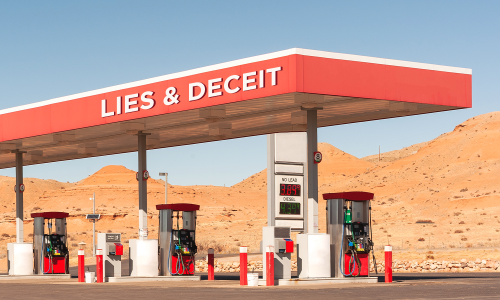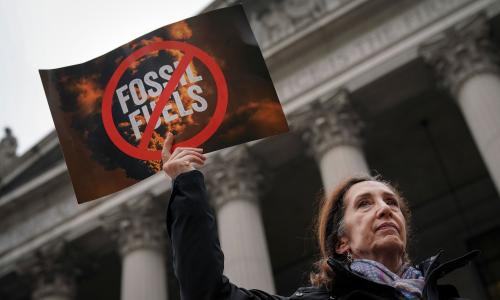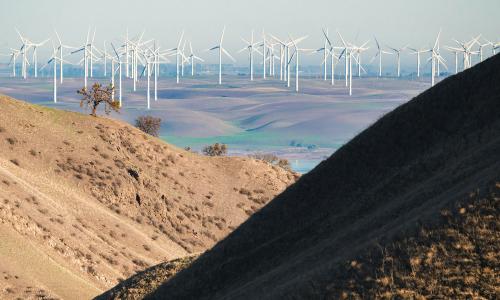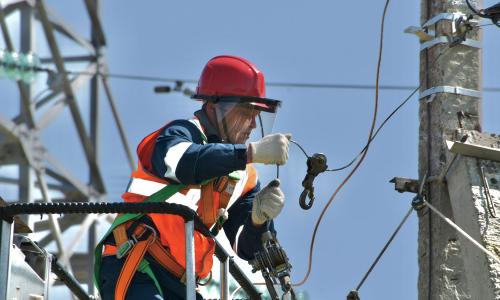Dozens of states, counties, cities, and tribes across the United States and its territories are currently suing major fossil fuel companies for fraud, climate damages, or racketeering.
This report assesses the wealth of documentary evidence behind these lawsuits, including recently released internal corporate documents. The evidence could hardly be clearer: For decades these companies possessed detailed and accurate knowledge about the dangers their products pose to the global climate and understood that climate action would threaten their business models. Yet they planned, funded, and continue to engage in a campaign to profit from the planet’s destruction by deceiving the public and blocking climate action.
Ongoing investigations link a criminal hacking scheme targeting climate accountability advocates to a Washington, DC, lobbying firm and one of its clients—a major oil and gas corporation.
At a time when the federal government is backsliding on climate action and pandering to fossil fuel interests, it is more important than ever to hold these corporations accountable for exacerbating the climate crisis.
Decades of Deceit
This is a portion of the full report. The full report can be downloaded here.
Dozens of states, counties, cities, and tribes across the United States and its territories are currently suing major fossil fuel companies for fraud, climate damages, or racketeering. This report assesses the wealth of documentary evidence behind these lawsuits—including recently released internal corporate documents. The evidence could hardly be clearer: For decades these companies possessed detailed and accurate knowledge about the dangers their products pose to the global climate and understood that climate action would threaten their business models. Yet they planned, funded, and continue to engage in a campaign to profit from the planet’s destruction by deceiving the public and blocking climate action. Ongoing investigations link a criminal hacking scheme targeting climate accountability advocates to a Washington, DC, lobbying firm and one of its clients—a major oil and gas corporation.
At a time when the federal government is backsliding on climate action and pandering to fossil fuel interests, it is more important than ever to hold these corporations accountable for exacerbating the climate crisis.
This report draws on dozens of internal fossil fuel industry documents obtained through investigative research, lawsuits, congressional subpoenas, publicly available reports, and industry testimony. It provides a decades-long review of what fossil fuel companies knew about climate change, when they knew it, and, critically, the extreme steps they took to deceive the public to protect their profits at the expense of people and the planet.
Scientists are now increasingly able to quantify the role of human-caused emissions in driving climate impacts and evaluate how carbon emissions from fossil fuels extracted by particular companies have contributed to climate change. Research has determined that just 122 companies are responsible for more than 94 percent of all industrial carbon dioxide (CO~2~) emissions since 1959 and 75 percent of all industrial CO~2~ emissions since 1981. In these time frames, fossil fuel companies already had clear scientific evidence that their products were contributing to climate change.
What Fossil Fuel Companies Knew about Climate Change—and When They Knew It
The report links to key documents spanning many decades, to let people see the evidence of this deception for themselves. These documents include the following:
- A 1980 presentation by Stanford climate scientist John Laurmann to the American Petroleum Institute, the fossil fuel industry’s largest trade association, in which Laurmann said global warming caused by fossil fuels would bring “major economic consequences” with potentially “globally catastrophic effects.”
- An internal 1988 report by Shell, acknowledging the significant portion of carbon emissions the company is responsible for and warning that “by the time the global warming becomes detectable it could be too late to take effective countermeasures to reduce the effects or even to stabilize the situation.”
- Testimony by Martin Hoffert, former head of ExxonMobil’s Research & Engineering division, at a 2019 congressional hearing. “Exxon was publicly promoting views that its own scientists knew were wrong,” Hoffert testified. “This was immoral and has greatly set back efforts to address climate change.”
What Fossil Fuel Companies Did Instead of Addressing Climate Change
Oil and gas companies were highly aware of the risks to them if the public learned about climate change threats and demanded accountability.
The companies feared similar consequences as those faced by the tobacco industry for the harms caused to public health by its products—which included a payout in the hundreds of billions of dollars from a landmark 1998 settlement. So the fossil fuel industry developed and deployed an aggressive campaign of deception and disinformation about climate science.
A 1998 “Roadmap” memo prepared by the American Petroleum Institute explicitly outlined how the companies could try to increase uncertainty among the public and policymakers about the realities of climate science. “Victory will be achieved when . . . average citizens ‘understand’ (recognize) uncertainties in climate science,” the plan stated.
The following decades saw the industry unleash these strategies and many others to distract and confuse the public. This report describes the following documentation of these strategies:
-
Court documents alleging a coordinated scheme to hack into the email accounts of staff members at the Union of Concerned Scientists (UCS) and several other public interest organizations, all of whom were working to hold fossil fuel companies accountable for their role in climate change. The documents, together with related reporting, suggest that the US government possesses evidence the criminal scheme was indirectly paid for by ExxonMobil and that one of its lobbying firms, the Washington, DC-based DCI Group, provided a list of “targets” to a middleman linked to the hackers and sent the fruits of the hacking to the oil and gas company.
-
Internal ExxonMobil communications subpoenaed by Congress in 2021. The evidence shows executives were aware that they were failing to invest sufficiently in a biofuels program, even while they were actively promoting the program as an example of the company’s commitment to environmental sustainability.
-
A trade show presentation by FTI Consulting, the PR agency hired to build and run the Energy in Depth website, which attacks climate accountability experts while promoting false claims about oil, fossil gas, and environmental and economic issues. Launched in 2009 by the Independent Petroleum Association of America, Energy in Depth has depended on backing from fossil fuel companies, including BP, Chevron, ExxonMobil, and Shell. The presentation states that the value of such programs and platforms lies in their “ability to say, do and write things that individual company employees cannot and should not.”
-
Video of an infamous and shockingly candid interview in which Keith McCoy, then ExxonMobil’s senior director of government affairs, admits that the corporation used front groups as part of its “fight” against climate science.
Preserving Access to Justice and Ratcheting Up Climate Accountability
A careful and thorough review leaves little room for doubt that major fossil fuel corporations deserve to be held accountable through all lawful means for their decades of climate deception and the resulting devastating damages.
UCS is calling for elected officials, investors, financiers, experts, and the public to increase pressure on these companies to do the following:
- Cease disinformation and greenwashing on climate science, public policy, and corporate actions.
- Stop obstructing science-informed public policy and its implementation.
- Pay an equitable share of the costs for climate damages; climate adaptation; and the environmental, social, and systemic impacts of fossil fuel products and production.
- Fully disclose, and regularly and publicly report on, risks and impacts to the climate, communities, and the economy.
- Accelerate actions, investment, and business planning for a fair and fast phaseout of fossil fuels worldwide.
- Stop violating civil rights, human rights, and the rights of Indigenous peoples.
Further, the report warns of a potential renewed push for a blanket waiver of liability for the fossil fuel industry and calls on federal representatives to do everything in their power to ensure any such effort does not succeed—so that communities harmed by climate change have access to justice and funding, and these corporations face legal and legislative consequences for their misconduct.
Downloads
Citation
Merner, Delta, Kathy Mulvey, Laura Peterson, Seth Shulman. 2025. Decades of Deceit. Cambridge, MA. Union of Concerned Scientists. https://doi.org/10.47923/2025.15837






